Physical Address
4 Elgon Terrace, Kololo, Kampala, Uganda
Physical Address
4 Elgon Terrace, Kololo, Kampala, Uganda

Africa’s AI landscape is blooming with linguistic diversity, as fresh datasets propel multilingual models into the spotlight. With over 2,000 languages—many underrepresented in global tech—the continent is reclaiming its narrative through homegrown innovations. In 2025, releases like the African Next Voices dataset have supercharged progress, enabling AI that speaks Swahili, Yoruba, and beyond with unprecedented accuracy.
A pivotal launch came in early September 2025: the African Next Voices project unveiled 9,000 hours of AI-ready speech data across 18 low-resource languages, including Kikuyu, Dholuo, Hausa, Yoruba, isiZulu, and Tshivenda. Spearheaded by linguists and computer scientists in Kenya, Nigeria, and South Africa, this $2.2 million Gates Foundation-backed effort captured everyday dialogues on farming, health, and education from diverse voices. The free-access trove addresses a glaring gap—African languages comprise just 0.1% of online content—fueling tools for real-time translation and transcription that could slash communication barriers in rural clinics and markets.
Complementing this, Lelapa AI’s InkubaLM, Africa’s inaugural multilingual small language model (SLM), evolved dramatically. In May 2025, the Buzuzu-Mavi Challenge—hosted with Zindi—shrank it by 75%, making it deployable on basic smartphones without constant internet. Optimized for low-resource tongues, the efficient SLM excels in education, agriculture, and customer service, proving scalable AI needn’t demand massive resources. Meanwhile, the July AI for African Languages Conference spotlighted novel data annotation techniques, accelerating story generation and machine translation for underrepresented dialects.
These strides echo broader trends: a June arXiv review highlighted LLMs’ potential despite data scarcity, while 2025 forecasts predict commercialization of localized models. As datasets democratize AI, Africa’s digital inclusion surges—envision chatbots aiding farmers in Amharic or health apps in Zulu. With investments rising 40% year-on-year, multilingual AI isn’t just gaining traction; it’s scripting a polyglot future, valued at $1.2 billion by 2030.